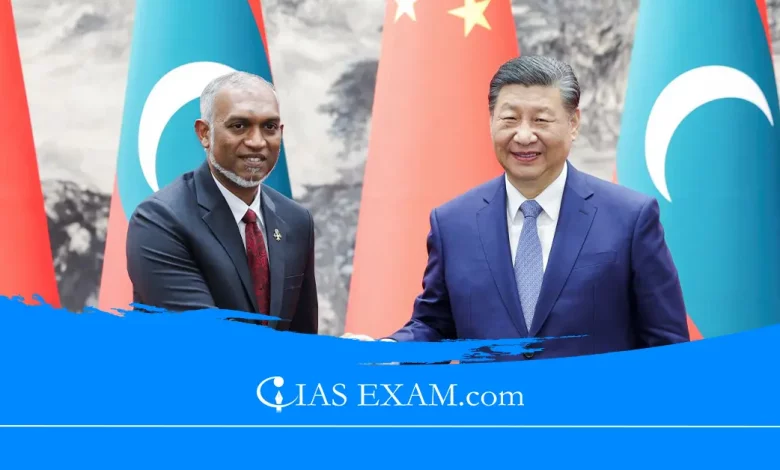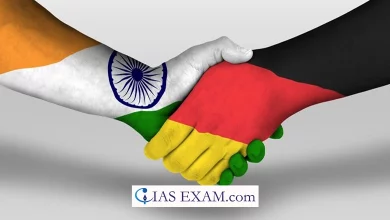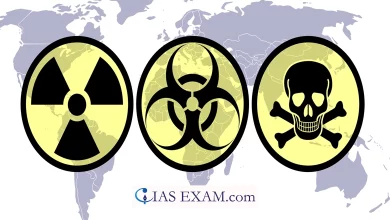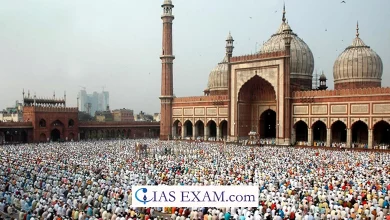Daily Current Affairs for UPSC
Defence Pact between Maldives and China
Syllabus- International Relations [GS Paper-2]

Context
Recently the Defence Ministry of Maldives announced signing a defence pact with China.
About
- They signed an agreement on “China’s provision of military assistance grants to the Republic of Maldives, fostering more potent bilateral ties”.
- Further, China donated 12 green ambulances to the Maldives’s Health Ministry.
- The development is in line with the two countries agreeing to “raise” China-Maldives relations to a “comprehensive strategic cooperative partnership”, all during Mr. Muizzu’s 5-day state visit to China in January, 2024.
Recent Maldives-India row
- The latest trigger has been undiplomatic phrases utilized by ministers in Maldives against Prime Minister Narendra Modi specifically and Indians in general.
- The new government led by President Mohamed Muizzu requested India to withdraw military personnel and chose China for one of his first overseas visits.
- Maldives President Muizzu in his visit additionally urges China to reclaim pinnacle spot in traveler arrivals which was dominated by India in the last few years.
- The incumbent government rode to energy on an ‘India Out’ poll campaign.
- The release of a report by the EU Election Observation Mission of Maldives said, the ruling coalition in Maldives deployed anti-Indian sentiments and tried to unfold disinformation in the 2023 presidential elections wherein Mr. Muizzu won.
- Maldives has also decided no longer to renew the agreement with India on a hydrographic survey of its waters.
- The agreement, signed on June 8, 2019, allowed India to conduct a hydrographic survey of the Maldivian territorial waters, have a look at and chart reefs, lagoons, coastlines, ocean currents and tide levels.
Historical context
- Pre-colonial ties: Trade and cultural trade flourished between the 2 areas for hundreds of years, forging deep and enduring social connections.
- Colonial era and independence: While both nations underwent colonization (Maldives via the British, India by the British and Portuguese), they maintained close links and mutual assistance throughout their independence struggles.
- Post independence: After the British relinquished control of the islands in 1965, India installed diplomatic ties.
- Under the Maritime Boundary Treaty of 1976, Maldives has identified Minicoy as a vital part of India.
- While there was no diplomatic mission in Male in advance (it was run by the Indian High Commission in Colombo till 1978 ), on account that 1980 India has had an ambassadorial representative in the islands.
- After the democratic transition began in 2008, India has constructed deep relationships with all applicable stakeholders, players in politics, defence, business, and civil society.
Significance of Maldives for India
- Geostrategic Importance:
-
-
- Location: Maldives’ proximity to the west coast of India (barely 70 nautical miles from Minicoy and 300 nautical miles from India’s West coast).
- Trade and commerce: Situated along essential maritime trade routes between the Gulf of Aden and the Strait of Malacca, the Maldives acts as a “toll gate” for almost half of India’s external trade and 80% of its energy imports.
- Maritime Security: Maldives is one of the key elements in India’s maritime safety calculus. A strong and friendly Maldives guarantees regional security and maritime balance, mitigating threats like piracy and terrorism.
- Counterbalancing China: Maldives offers a possibility for India to counterbalance China’s growing influence in the Indian Ocean, fostering regional balance of power.
-
- Economic and Political Connections:
-
-
- Strong cultural and historical ties: The Maldives and India share near cultural and historic hyperlinks, fostering deeper understanding and cooperation.
- Economic partnership: India is one of the biggest buyers and tourism markets for the Maldives, with full-size change and infrastructure tasks underway.
-
- Additional Advantages:
-
- Climate change resilience: Collaborating with the Maldives on climate change mitigation and variation is important for both countries as susceptible nations.
- Defence: The reason why India invests in Maldives’ safety by training its defence forces is to be able to hold a watch at the activities in the Indian Ocean.
- Estimates propose that nearly 70 per cent of Maldives’ defence education is completed by India — both at the islands or in India’s elite defence academies.
Significance of India for Maldives
- Daily needs: India elements Maldives with its normal necessities: rice, spices, end result, vegetables, poultry, medicines and life-saving medicines.
- India additionally materials primary items to construct infrastructure in Maldives — cement, rock boulders.
- Education: India has been the education provider for Maldivians. Since the country has a small population base and the islands are isolated and spread out, there are not any important academic institutions. So, each year, Maldivian students come to Indian higher instructional establishments.
- Economic dependence: Of the Rs 50 crore general trade between India and Maldives in 2022, Rs 49 crore was India’s exports to Maldives. India emerged as Maldives’ 2nd biggest trade partner in 2022.
- Help in the course of failures: India has been the principal pillar of help for Maldives in instances of disaster and misery. When a tsunami struck the islands in 2004, India was the first to send in help.
- Again, in 2014, whilst Male abruptly had a ingesting water disaster because the predominant desalination plant broke down, India overnight airlifted consuming water to the islands.
- During the Covid-19 pandemic, India sent critical medicines, masks, gloves, PPE kits and vaccines for the island country.
- Security provider: When there was a coup attempt in 1988 in opposition to the then President Abdul Gayoom, India sent in troops to fight the opponents.
Challenges
- Political Instability
-
-
- Domestic turmoil in the Maldives: Recent political upheavals and modifications in government can create uncertainty and complicate long-term cooperation initiatives.
-
- Chinese Influence
-
-
- Economic and infrastructure investments: China’s growing monetary presence in the Maldives, evidenced by investments in infrastructure projects and debt-entice international relations, may be perceived as a challenge to India’s strategic interests in the region.
- Defence goals: Chinese naval expansion and ability to pursue military pursuits in the Indian Ocean with the active support from Maldives can boost concerns for India.
-
- Security Concerns
-
-
- Non-conventional threats: Piracy, terrorism, and drug trafficking remain concerns in the area, requiring continuous collaboration and intelligence sharing between India and the Maldives.
- Extremism and radicalization: The Maldives’ vulnerability to spiritual extremism and radicalization poses a security threat that necessitates joint efforts in countering such ideologies.
-
- Economic and Environmental Concerns
-
-
- Trade imbalance: The giant trade imbalance between India and the Maldives should cause resentment and calls for diversifying trade partnerships.
- Impact of climate change: Both countries are fantastically at risk of weather change and growing sea stages, requiring coordinated efforts for edition and environmental protection.
-
- Misperception and communication gap
-
- Lack of direct communication channels can result in misunderstandings and misinterpretations between the two countries.
- Influence of domestic pressure agencies: Domestic strain corporations or vested hobbies in each country can on occasion restrict cooperative initiatives or sow discord in the courting.
Overcoming the challenges
- Open and transparent communication: Regular talk at all levels can address concerns and build trust.
- Focus on common interests: Prioritizing areas like maritime security, climate trade, and economic development can solidify the inspiration of the partnership.
- Respect for sovereignty and non-interference: Both countries must admire every different internal affairs and keep away from interference in domestic politics.
- Strengthening people-to-people ties: Cultural trade programs and academic collaborations can foster deeper expertise and empathy.
- Addressing internal issues: Both India and the Maldives need to cope with domestic challenges like corruption and instability to project a positive image and foster a stable partnership.
Way Ahead
- In this current context, it’s far in the interest of both New Delhi and Male to dial down the modern-day tensions, by alleviating each other’s worries and cooperating on what topics most for both sides.
- By acknowledging and addressing those challenges, India and the Maldives can navigate the complexities in their courting and build a stronger, greater resilient, and at the same time beneficial partnership for future.
Source: The Hindu
UPSC Mains Practice Question
Q.Discuss the political developments in the Maldives in the last two years. Should they be of any cause for concern to India? (2013)





.png)



